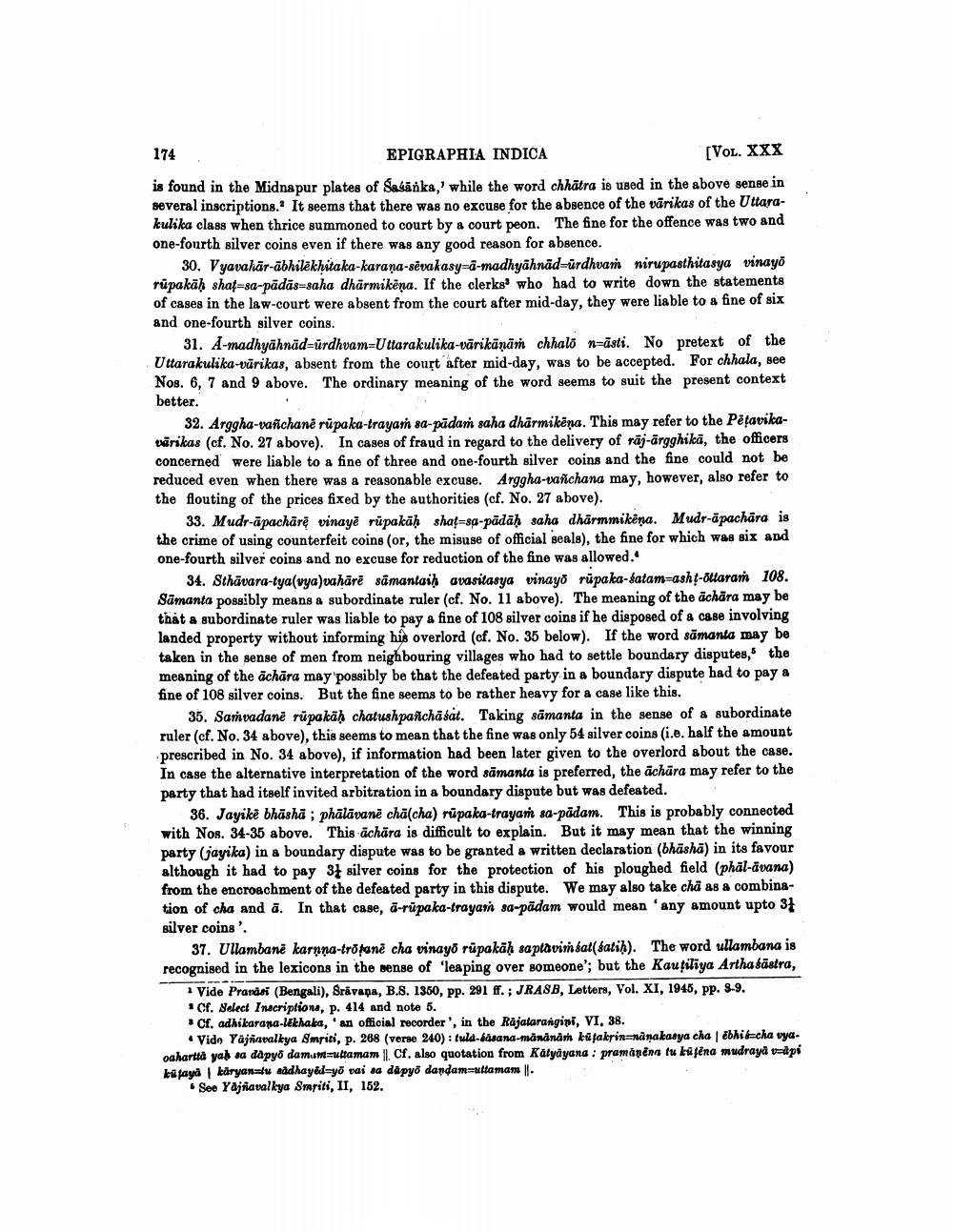________________
174
EPIGRAPHIA INDICA
[VOL. XXX
is found in the Midnapur plates of Sasanka,' while the word chhatra is used in the above sense in several inscriptions. It seems that there was no excuse for the absence of the värikas of the Uttarakulika class when thrice summoned to court by a court peon. The fine for the offence was two and one-fourth silver coins even if there was any good reason for absence.
30. Vyavahar-abhilekhitaka-karana-sevakasy-a-madhyāhnād-ürdhvam nirupasthitasya vinayo rūpakāḥ shat-sa-pādās-saha dharmikēna. If the clerks who had to write down the statements of cases in the law-court were absent from the court after mid-day, they were liable to a fine of six and one-fourth silver coins.
31. A-madhyāhnād-ürdhvam-Uttarakulika-värikānāṁ chhalō n-asti. No pretext of the Uttarakulika-värikas, absent from the court after mid-day, was to be accepted. For chhala, see Nos. 6, 7 and 9 above. The ordinary meaning of the word seems to suit the present context better.
32. Arggha-vañchaně rūpaka-trayaṁ sa-pādam saha dharmikēņa. This may refer to the Pětavikavärikas (cf. No. 27 above). In cases of fraud in regard to the delivery of raj-ärgghikā, the officers concerned were liable to a fine of three and one-fourth silver coins and the fine could not be reduced even when there was a reasonable excuse. Arggha-vañchana may, however, also refer to the flouting of the prices fixed by the authorities (cf. No. 27 above).
33. Mudr-apachārē vinaye rūpakāḥ shat-sa-pādāḥ saha dharmmikena. Mudr-apachāra is the crime of using counterfeit coins (or, the misuse of official seals), the fine for which was six and one-fourth silver coins and no excuse for reduction of the fine was allowed.
34. Sthavara-tya(vya)vahārē sāmantaiḥ avasitasya vinayo rūpaka-satam-asht-ottaram 108. Samanta possibly means a subordinate ruler (cf. No. 11 above). The meaning of the achāra may be that a subordinate ruler was liable to pay a fine of 108 silver coins if he disposed of a case involving landed property without informing his overlord (cf. No. 35 below). If the word samanta may be taken in the sense of men from neighbouring villages who had to settle boundary disputes, the meaning of the achāra may possibly be that the defeated party in a boundary dispute had to pay a fine of 108 silver coins. But the fine seems to be rather heavy for a case like this.
35. Samvadaně rūpakaḥ chatushpañchasat. Taking samanta in the sense of a subordinate ruler (cf. No. 34 above), this seems to mean that the fine was only 54 silver coins (i.e. half the amount prescribed in No. 34 above), if information had been later given to the overlord about the case. In case the alternative interpretation of the word samanta is preferred, the achāra may refer to the party that had itself invited arbitration in a boundary dispute but was defeated.
36. Jayikê bhasha; phālāvane cha(cha) rūpaka-trayam sa-padam. This is probably connected with Nos. 34-35 above. This achara is difficult to explain. But it may mean that the winning party (jayika) in a boundary dispute was to be granted a written declaration (bhasha) in its favour although it had to pay 3 silver coins for the protection of his ploughed field (phal-avana) from the encroachment of the defeated party in this dispute. We may also take cha as a combination of cha and a. In that case, a-rupaka-trayam sa-padam would mean 'any amount upto 3 silver coins'.
37. Ullambanë karnna-tropane cha vinayo rūpakāḥ saptavim sat(satih). The word ullambana is recognised in the lexicons in the sense of 'leaping over someone'; but the Kauțiliya Arthasastra,
1 Vide Pranasi (Bengali), Sravana, B.S. 1350, pp. 291 ff.; JRASB, Letters, Vol. XI, 1945, pp. 3-9.
1 Cf. Select Inscriptions, p. 414 and note 5.
Cf. adhikarana-lekhaka, an official recorder', in the Rajalarangini, VI, 38.
Vido Yajnavalkya Smriti, p. 268 (verse 240): tula-basana-mänānāṁ kufakrin-nanakasya cha | ebhib-cha vyaoahartta yah sa dapyo damum-uttamam . Cf. also quotation from Katyayana: pramaņēna tu kujëna mudraya väpi küjaya | käryan-tu aadhayed-yö vai sa dapyo dandam-uttamam ||.
See Yajnavalkya Smariti, II, 152.




